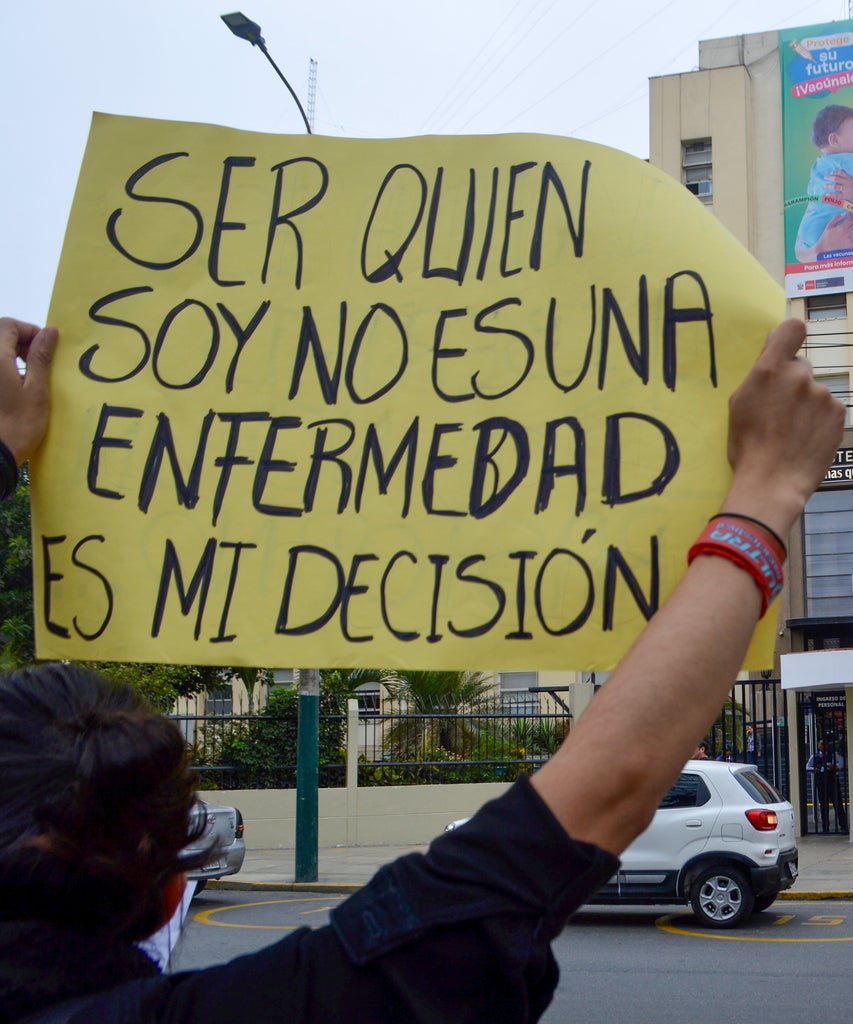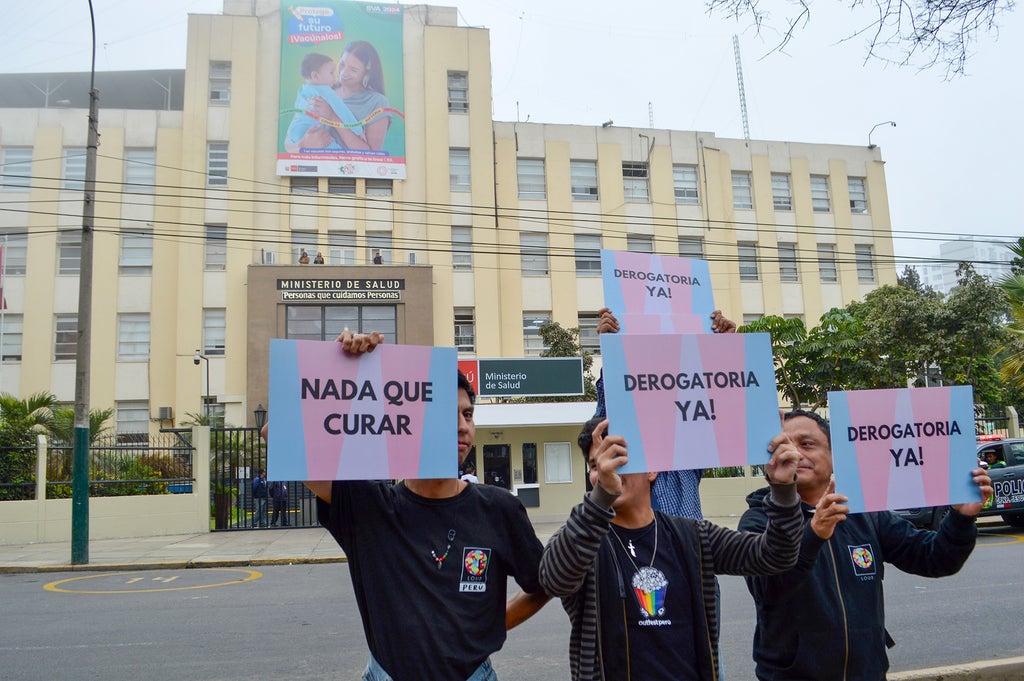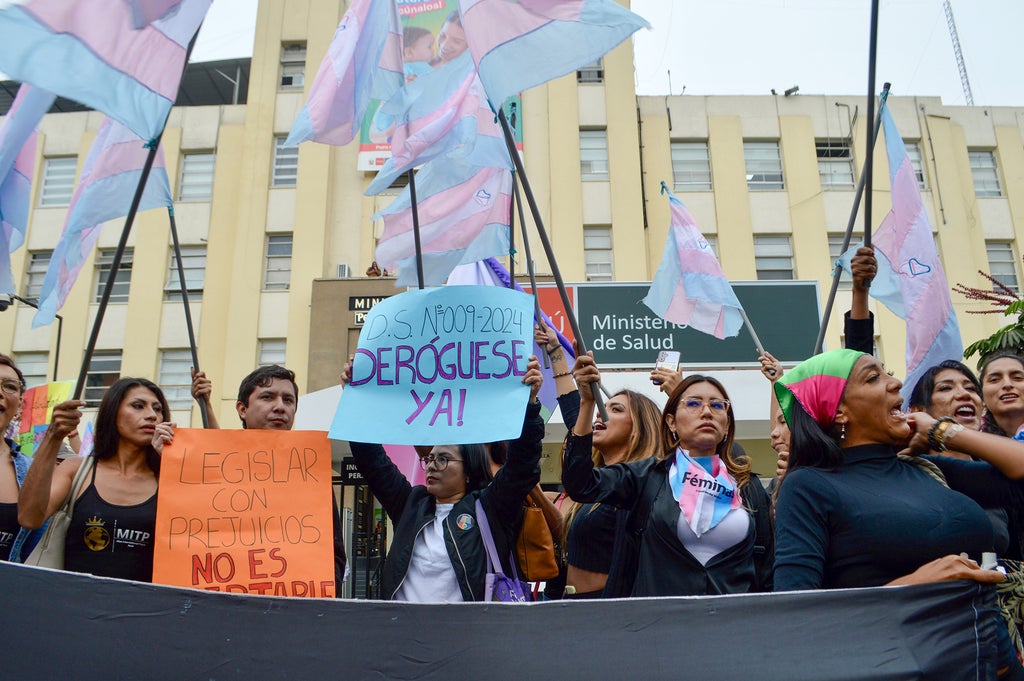
Weeks before the start of Pride month, when many companies and politicians choose to court the LGBTQ community, Peru was making headlines for the opposite: the government passed a health decree that referred to transgender people as having a “mental health problem” and “gender identity disorders.”
Outrage and protests followed. Using the hashtag #NadaQueCurar, nothing to cure, advocates locally and abroad argued it was a shocking show of ignorance that is exposing LGBTQ people to further discrimination by treating trans people as diseased. The decree was slammed by international civil rights organizations, like Human Rights Watch, and even a U.S. Representative, Robert Garcia, who is openly gay and the only Peruvian American in Congress.
They have all asked for authorities to repeal the order. Peruvian health officials say they won’t.
Instead, they insist that it has all been a misunderstanding of an effort to grant transgender people access to mental health benefits through private medical insurance.
“We have explained to them [LGBTQ advocates], first, that there is no intention to pathologize any condition related to sexual identity because it is not a pathology,” Henry Horna, spokesman for the Ministry of Health, tells Refinery29 Somos. “It was a solution to a practical problem, which occurs in the private insurance system, not in the state system.”
“There is no intention to pathologize any condition related to sexual identity because it is not a pathology. It was a solution to a practical problem, which occurs in the private insurance system, not in the state system.”
Henry Horna
Specifically, the Ministry of Health document published last month mentions “dual-role transvestism,” “transsexualism,” “fetishistic transvestism,” and “gender identity disorder in childhood” as mental health conditions that must now be covered by private health insurance companies operating in Peru.
In a country where trans women are regularly beaten, extorted, or even killed, and discrimination runs rampant in the health care system, advocates counter that the decree could open the door to so-called conversion therapies because it defines transgender people as sickly. Peru’s government has published guidelines in recent years that discourage medical professionals from using conversion therapies because they are considered to be a type of torture, but the practice is not explicitly outlawed.
“Conversion therapies still exist in our country. The way this decree is written opens the doors for bad health professionals, for example, to diagnose a trans person as if they were sick and seek mechanisms to change their identity,” Alex Hernández, project director at the local LGBTQ organization Más Igualdad Perú, tells Somos.

Health officials argue that these terms are not their own — they had to be used to align to the international health care coding system currently in place in Peru, the tenth version of the International Classification of Diseases (ICD). The ICD is a system of disease descriptions and terminologies written by the World Health Organization (WHO) that is used by most countries to classify health data, and it helps with everything from death certificates and statistics to billing codes. The WHO updates this list to reflect new diseases or changes in research.
The most recent version of that system, the ICD-11, was launched in 2022. Among other changes, it updates terms referring to transgender people. It now refers to “gender incongruence” under a section on sexual health, rather than relegating transgender issues to the section on mental health disorders. Advocates say this change is crucial for health systems to leave behind stigmas on what it means to be trans.
But it is still in the process of being implemented in most countries, including Peru and the U.S. The WHO says that, as of last month, 132 countries and areas are at varying phases of implementation.
Still, officials say they were forced to publish this decree now as a work-around to give trans people in the private health system access to mental health benefits, while the government works to implement the updated ICD-11. Peru passed a mental health law that went into effect in 2020 that forced health insurance companies to cover everything that was under the active classification system. It’s unclear why the Ministry had not added the terms related to trans people prior to last month. According to Horna, that’s a question for past administrations.
“Conversion therapies still exist in our country. The way this decree is written opens the doors for bad health professionals, for example, to diagnose a trans person as if they were sick and seek mechanisms to change their identity.”
Alex Hernández
“It is not a situation that can occur from one moment to the next. It involves making an entire change in all the coding. And for some countries, it will take years. We are talking about an average of, in the best of cases, five to ten years,” Horna says.
The decree, they say, is also meant to give trans people with private health insurance access to hormone therapies. In Peru, endocrinologists require a psychologist’s note before starting hormone therapy. But advocates argue there was no need to publish a decree endorsing outdated terms that are no longer part of the WHO’s disease classification system.
“During all the time that the Ministry of Health should have been starting the implementation of the ICD-11, there has been no progress,” says Hernández, who is also a psychologist. “It means that in Peru, a diagnostic system from 30 years ago, from the ‘90s, is being used. So we have a health system that is not providing the necessary conditions for anyone to receive care, much less a vulnerable group like the LGBT community.”
More importantly, she says the decree affects very few people in practice, since many trans people face barriers to getting formal work and lack the financial means to buy private health insurance.

And even in Peru’s public health system, Hernández says trans people face routine discrimination.
In Peru, trans people who want to change their names have to present their cases through administrative court proceedings that could take years to conclude. It’s a burdensome process that, even those who have faced it successfully, say can be full of humiliations, misgendering, and invasive questioning. This is not the case in other Latin American countries like Chile, Brazil, Argentina, or Uruguay.
“Not having recognition of their identity impedes them in many ways. … Many are living in very precarious situations. How are they going to be able to pay for private insurance if they cannot even earn a minimum wage, have a formal job, or access housing, for example,” Hernández says.
Lesly Quispe, a member of the trans collective Féminas Perú, says the decree will only increase the stigma against trans people and supports its replacement.
“If they legislate and issue regulations for the private sector all the time, why don’t they do it for us, a vulnerable, tax-paying population? They should act with the same speed with which they issued that decree.”
Lesly Quispe
“If they legislate and issue regulations for the private sector all the time, why don’t they do it for us, a vulnerable, tax-paying population? They should act with the same speed with which they issued that decree,” Quispe tells Somos during a recent protest in front of the Ministry of Health in Lima.
Hernández adds the trans community’s concerns are not just fears, but have been validated in real life. She says her organization has intervened in at least one case where a trans man was verbally harassed by a coworker in the aftermath of the decree’s publishing.
“Basically, he was told, ‘You are sick. And I can tell you that you’re sick because even the Ministry of Health has said that you are mentally ill,'” Hernández says. “People are making homophobic statements like, ‘You are sick. We need to institutionalize all of you.’ … These kinds of messages are appearing on social media, all legitimized by what the decree says.”

Horna, from the Health Ministry, says he knows that some of the concerns stem from day-to-day discrimination against trans people in Peru, but repealing the decree is not currently an option because it would “leave a part of the population that has private insurance vulnerable” to having mental health treatment denied. He notes that officials have sat down with LGBTQ advocates, with the intention of including their perspectives in future measures in favor of the queer community.
Advocates are skeptical.
“Our condition right now for doing so is the repeal [of the decree], because that is what is urgent,” Hernández says. “We need to see that political gesture before we can be part of this commission or working group. If we do not see the political gesture, we think that they are just using us to say, ‘We are already doing something.'”
Like what you see? How about some more R29 goodness, right here?
from Refinery29 https://ift.tt/kYnUfgM
via IFTTT
